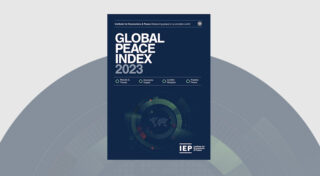Health care professionals treat the injured and ill. They do not treat a religions, a cultures, or a nationalities. They treat a patient, the person who is in front of them with a health care need. They do this to the best of their ability with what resources they have at their disposal with their primacy being quality of care to the patient. When you think about the work of health care workers; doctors, nurses and allied health professionals, they engage the Pillars of Positive Peace by doing their job.
Through the research of the Institute for Economics & Peace (IEP) into the most peace nations and communities, IEP identified the eight Pillars of Positive Peace which we know working together as a system creating the optimum environment for people to flourish – Positive Peace. These eight Pillars of Positive Peace are:

In 2013, when a young 4-year-old Palestinian girl by the name of Rozana fell from the ninth floor of her family’s apartment block near Ramallah her chances of surviving her life-threatening injuries were far higher at the Hadassah Medical Centre in Jerusalem. The volunteers that assisted with the logistics and the health care professionals who treated Rozana saw a gravely ill girl in need of the best care possible for her survival. Rozana did survive and recovered from her injuries. To achieve this outcome, it is easy to see how the Pillars of Positive Peace were engage, Good Relations with Neighbours, Acceptance of the Rights of Others, Equitable Distribution of Resources, Free Flow of Information among other.
This event led to the establishment of Project Rozana, which has repeated this experience over and over again for a range of different health care needs. Teams of volunteers, logisticians, health care professions transport and care for Palestinian patients in Israeli hospitals. The project has grown with Israeli health care professions now supporting the professional development of Palestinian health care professions. The collaboration and cooperation to achieve better health care outcomes has established a capacity for peacebuilding among the community of health care professionals and their patients.
In 2023, ten years after the establishment of Project Rozana, 33 senior nurses from nine Palestinian and Israel hospitals came together at the Biankini Village, on the Dead Sea for the USAID funded, Nurses Hub project, a Project Rozana and IEP initiative. They were not there to discuss clinical practice; they were there to discuss peacebuilding. ‘I have never sat in the same room as the other side,’ exclaimed one participant. ‘We have collaborated and talked about patients, but we have never sat together and talked about each other.’ This workshop was not only about building an understanding of how the work they do builds Positive Peace, but also to build relationships and how to magnify the peacebuilding opportunity their work provides across their hospitals and across their communities.
Across the 4 days of the workshop the participants learnt about Positive Peace. They learnt about each other. They learnt about how their individual and collective actions could influence and strengthen social systems. Then they collaborated, developing actions based on the eight Pillars of Positive Peace. Real and achievable actions they could enact within their own work units, hospitals and communities. The conflict in this region is often labelled intractable. This is not language that peacebuilders embrace. These motivated nurses are testament to what is achievable, what is tractable. Ten years after the inception of Project Rozana, it now explicitly positions the Projects health care professionals as peacebuilders.

Learn more about Positive Peace from the latest Global Peace Index.
Global Peace Index 2023